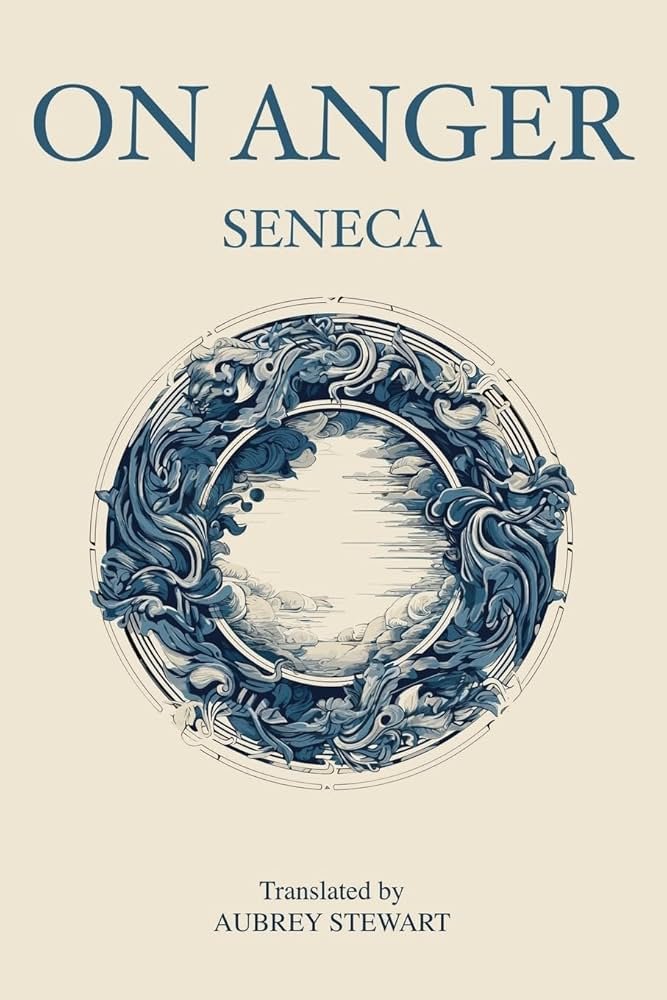The Stoics on Anger
 (Source: https://www.amazon.ca/Anger-Seneca/dp/8793494734)
(Source: https://www.amazon.ca/Anger-Seneca/dp/8793494734)
My entire life, I have always had troubles learning to control my anger. I grew up in a very antagonist household; my family never believed in addressing the existence of anger, so learning how to tame it was never an option. Rather, anger was always met with further hostility: "Stop being angry! Go to your room! Apologize, even though you don't mean it!! 😠"
Is it any wonder then, that I have developed behavioral issues over the years? A short fuse with ultra-violent thoughts, and an even sharper tongue. There have been plenty of times where the consequences -- the aftereffect from my anger -- has filled me with immediate guilt. Even the situations that "warrant" anger, like reinforcing boundaries after someone overstepped, does not make my emotions feel any more justified.
"You are right in feeling especial fear of this passion, which is above all others hideous and wild: for the others have some alloy of peace and quiet, but this consists wholly in action and the impulse of grief."
 (All images created using an AI art generator on NightCafe)
(All images created using an AI art generator on NightCafe)
So imagine my delight when I discovered some Stoic knowledge on the topic! 😄 Philosopher Lucius Seneca has blessed us with his personal interpretations of anger -- knowledge that has been passed down for centuries. Surely there must be truth to it, if it continues to ring true to people today. After all, human nature is innate, and there will always be universal truths that withstand the test of time.
One of Seneca's main arguments, is he believes anger to be "unnatural" to man. Out of all of the emotions, anger is the most destructive and vile. It does not allow us to see reason -- we would slap our fondest friend for looking at us the wrong way! 😩
"Anger, as we have said, is eager to punish; and that such a desire should exist in man’s peaceful breast is least of all according to his nature; for human life is founded on benefits and harmony and is bound together into an alliance for the common help of all, not by terror, but by love towards one another."
Once anger has subsided, then there are its aftershocks to endure. Again, anger refuses to see reason, and causes us to do and say things that we otherwise would not have the passion to commit.
My biggest obstacle is the guilt that follows afterwards. Even if I have not said or done anything, my thoughts during the rage are enough to make me recoil in horror, and the fiery energy leaves my entire being frayed...
"Next, if you choose to view its results and the mischief that it does, no plague has cost the human race more dear."
I have difficulties, however, accepting Seneca's stance that anger is unnatural. It is something that everyone experiences and can some times seem to arise with little cause. The fact is, if we did not produce it of our own accord, then it wouldn't be natural.
"When pleasures have corrupted both the body and the mind, nothing seems endurable, not indeed because it is hard, but because he who has to bear it is soft."
"Every weakling is naturally prone to complaint."
I look to my children. Our oldest was about 2-years-old when she truly began to show genuine rage -- "unable to control herself" anger. Yet, why does she feel anger in the first place? She wasn't "taught" it, she is not exposed to a hostile environment, she's not consuming violent media, etc. Mommy and Daddy are not perfect, she has obviously seen us angry ourselves, but it isn't frequent behavior that she can learn to mimic.
Therefore it manifests of her own accord. Then, what other basis could someone have to call it unnatural? Children don't begin to feel guilt until later on in life, and guilt typically only results as a byproduct of anger -- is guilt "unnatural" as well?
"Every one when he calls himself innocent looks rather to external witnesses than to his own conscience. How much more philanthropic it is to deal with the erring in a gentle and fatherly spirit, and to call them into the right course instead of hunting them down?"

The greatest remedy that Seneca encourages for anger is delay, or time. No matter which way we choose to use time -- meditating, venting to someone, punching a bag -- the objective is to redirect anger so that it does not manifest.
Keep in mind that anger causes the most destruction and grief; is a minor trifle truly worth the damage?
“'I am in a rage,' said he; 'I should beat him more than I ought: I should take more pleasure than I ought in doing so': let not that slave fall into the power of one who is not in his own power.
Or even for traumatic events, say someone has murdered your loved one. Man asks, "Should we not be angry with such an injury? Should I not be angry on behalf of the wrong committed against my loved one?" Seneca tells us that we should seek honor in this instance; he claims that we should avenge their death, but we do so with honor and integrity, not anger.
Remember that anger can cause us to exaggerate a wrong, and seeks to indulge in punishment as opposed to correcting the wrong.
"Now we ought to fight against the first causes of evil: the cause of anger is the belief that we are injured; this belief, therefore, should not be lightly entertained. We ought not to fly into a rage even when the injury appears to be open and distinct: for some false things bear the semblance of truth."
Seneca also tells us to "think of everything; expect everything." After all, how can we be angry with things that we expect? Why be angry with a dog for barking? Or a toddler for having a tantrum? These things should be expected.
Likewise, Seneca tells us that we cannot get angry with inferior men because they are ignorant, and we cannot get angry with superior men for having the wisdom to correct our own errors.
"Think of everything, expect everything: even with men of good character something queer will crop up: human nature produces minds that are treacherous, ungrateful, greedy, and impious: when you are considering what any man’s morals may be, think what those of mankind are."
Most importantly, as any true Stoic will tell you: remember to keep death in mind. We are only here for a short time, and we spend so much of it preoccupied with stupid shit. Money, politics, internet drama, family affairs, pet peeves, kids misbehaving...
Rather, Seneca offers us a different perspective: be grateful for what one has. Stop comparing your situation to others'. Remember the times when you once had more, similar to the times when you once had less -- the tide changes so quickly. Always be happy when you have less, for it gives you the opportunity to achieve more
"No man is satisfied with his own lot if he fixes his attention on that of another: and this leads to our being angry even with the gods, because somebody precedes us, though we forget of how many we take precedence... Yet so churlish is human nature, that, however much men may have received, they think themselves wronged if they are able to receive still more... Rather than speak thus, thank him for what you have received: wait for the rest, and be thankful that you are not yet too full to contain more: there is a pleasure in having something left to hope for."

Lots of great quotes in this review - thank you - I really need to read Seneca. In college I was too young to appreciate most of the great wisdom I read. (Yes, "youth is wasted on the young," as they say.)
All this wisdom that's been around for centuries, yet we still keep learning the hard way.